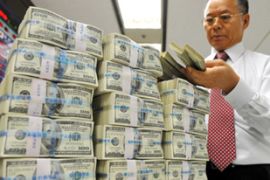Jitters plague Asia markets
Stocks remain volatile after banks’ concerted effort to stimulate global economy.

Banks remained nervous about lending between each other for fear of not being able to recover loans.
| IN DEPTH | ||
|
|
Japan’s central bank pumped $20bn into money markets on Thursday – the biggest one-day injection since the credit crisis began. It was the banks 17th injection of funds to try to ensure a flow of cash vital to the financial system.
The Bank of Japan welcomed the co-ordinated rate cut by other central banks but did not join in.
But Taro Aso, Japan’s prime minister, called for more action to bolster the country’s faltering economy on Thursday.
Kosuke Hori, policy chief of Aso’s ruling Liberal Democratic party, said the premier had asked coalition leaders to consider crafting a new emergency package beyond the $18bn economic stimulus plan proposed in late August.
The call came as Japan’s core machinery orders – a leading indicator of corporate capital spending – plunged at the fastest pace in two years, reinforcing fears of a recession.
Australia’s central bank had already cut its key interest rate by a full percentage point on Tuesday – double the amount that was expected and the biggest rate cut since 1992 – but it brought only a brief respite to Australian markets.
South Korea’s central bank followed Taiwan and Hong Kong’s lead on Thursday, cutting its key interest rate for October by 25 basis points to five per cent – the first since November 2004 and a reverse from a quarter of a percentage point increase in August to fight inflation.
Paulson warning
In trading on Wednesday, the Dow Jones Industrial Average rallied 150 points after the interest rate cut announcement by central banks.
But it dropped sharply in the last half hour of trading to close 2.2 per cent lower.
Henry Paulson, the US treasury secretary, welcomed the co-ordinated central bank rate cuts as a “sign that central banks around the world are prepared to take the necessary steps to support the global economy during this difficult time”.
Speaking to reporters on Wednesday ahead of a gathering on Friday of finance ministers and central bankers from the G7 industrialised nations, he urged governments to “continue to take individual and collective actions to provide much needed liquidity, strengthen financial institutions through the provision of capital … and protect the savings of our citizens”.
And he urged greater unity in central bank efforts, “so that the action of one country does not come at the expense of others or the stability of the system as a whole”.
Despite the unprecedented central bank efforts though, Paulson warned on Wednesday that global financial markets remained severely strained and several more banks would probably still collapse despite the $700bn bailout plan approved last week.
Saying “the turmoil will not end quickly and significant challenges remain ahead”, Paulson urged patience and said the government was working hard to implement the plan but that it would be a few weeks before it kicked in.
